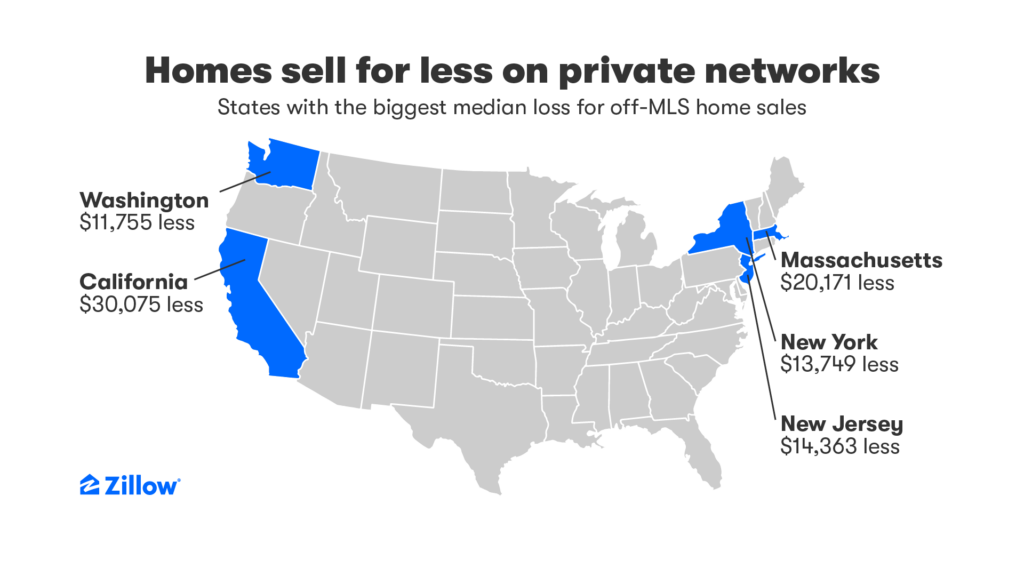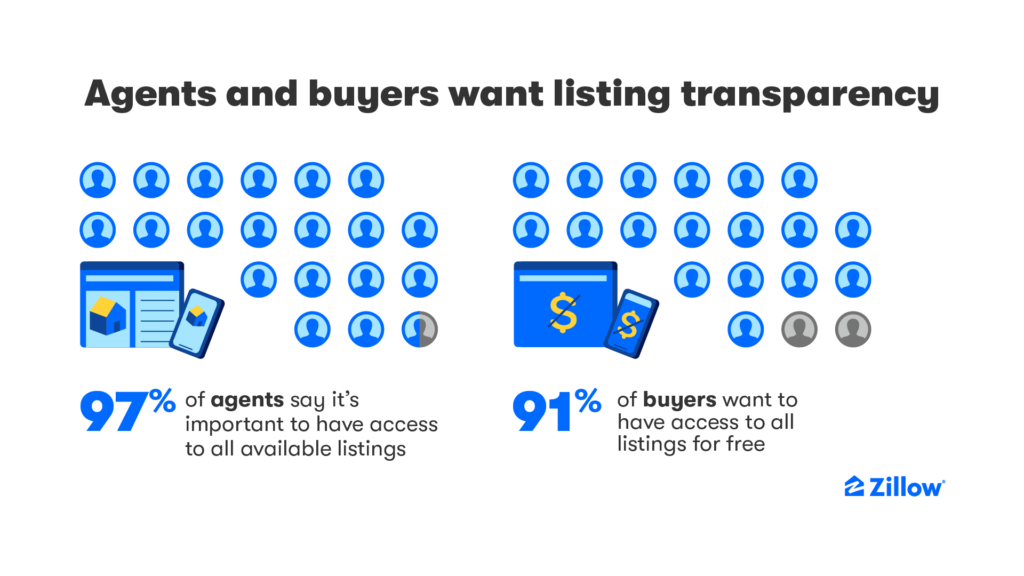Transparency and equitable access to real estate listings are at risk, threatening to push the industry backward and harm buyers, sellers and their agents.
Most homes for sale are listed on the Multiple Listing Service (MLS), a database shared by the real estate industry so all agents can see each other’s listings and best serve their clients. The MLS database is also what efficiently feeds listings to consumer platforms, allowing you to see for-sale homes on places like Zillow, Realtor.com, Redfin and many other sites. However, there is a concerning push by some within the real estate industry to hide homes for sale on private networks – through what’s known as a “pocket listing” or “private listing network” – which are accessible only with and through exclusive groups of agents.
We are staunchly against anything that prevents open, fair and transparent access to listings, and believe listings should be entered into the MLS within one day of public marketing, helping all buyers, sellers and their agents. And we invite the entire industry to join us as we work toward pro-consumer solutions that support supply and better affordability. We simply cannot go back to the dark ages of real estate when it’s so clear that restrictive practices of pocket listings and private listing networks harm sellers and buyers, and increase the potential for discrimination.
Sellers lose money so some brokerages can gain
Let’s start with the impact on sellers. New Zillow research shows that sellers want an agent who gets their home in front of the largest pool of potential buyers, can get the highest sale price and can close the sale quickly. It’s up to their agent to deliver, but those using private listing networks actively work against all three of these important seller needs. Some brokerages tout private listings to their clients as a way to test the waters and try out a listing price. In reality, a private listing limits exposure, ultimately costing the seller thousands of dollars, on average.
Make no mistake, this practice is designed to benefit a participating brokerage’s own bottom line as an attempt to ‘double dip’ on commissions from both sides of the transaction within their brokerage. And it comes at the expense of the seller, who is parting with what is often the biggest financial investment of their lifetime and not reaping the full benefit.

New Zillow research shows home sellers who didn’t market their listing on the MLS left more than $1 billion on the table in 2023 and 2024. In California, a home sold off the MLS typically yielded $30,075 less than a home that was listed publicly, the recent analysis shows. Throughout the state of New York, private network sellers typically walked away from an extra $13,749. That’s more than the same sellers likely paid for their agent’s commission, and it’s simply so the buyer agent’s commission can go to someone within the same brokerage.
A multi-state study by BrightMLS and Drexel University from last year found that MLS-listed homes also sold faster. This makes sense. Listings with maximum exposure get the maximum price. And Americans overwhelmingly told us in a Harris Poll survey in January that they understood the way to start a bidding war was to get a listing in front of the most people.
For the very few people who need maximum privacy over maximum price (think celebrities), there already are options to have a home privately listed but still in the MLS for all agents in the market to see for their buyers. This practice should be the exception, not the rule, because it doesn’t serve the needs of most sellers. And, most MLSs do allow sellers to opt out of having their listing online. But for those who believe they are making the decision to list with a private network for any sort of reduced hassle in the form of avoiding showings or timing delays need to understand the clear tradeoff they’re likely making in price and selling speed.
Buyers lose options – and potentially their dream home
Buyers are also hurt by private listing networks. Zillow’s research shows that almost all buyers – 91% – believe they should be able to see all listings and be able to access these for free, without barriers. The only way a buyer can see homes for sale in a private network is by agreeing to work with an agent from a certain brokerage, often getting locked into a commission rate and agreement before seeing the inventory. This process of limiting access to see all listings and removing the option of which agent a buyer wants to hire creates a massive disadvantage to buyers.
Buyers rely on agents to guide them through the transaction and should work with an agent who delivers real value – not value based on access to an exclusive club that exists to steer buyers toward homes that are listed by other agents in the same brokerage and capture more commission. It also increases the risk of dual agency – in which the same agent represents both the buyer and the seller. When this happens, both seller and buyer lose because it’s not possible for an agent to effectively represent both parties’ interest in a single transaction. Much like a lawyer could not properly represent both plaintiff and defendant.
Private listing networks also mean buyers potentially making more tradeoffs than necessary, and missing out on homes that could be their best option. In the current market, in which housing supply remains down 26% from pre-pandemic levels, seeing the full picture of the market becomes even more critical for a home shopper and for the health of the market.
Agents also are being misinformed
Large brokerages touting the benefits of private listing networks are the only party that stands to gain by proliferating these “velvet rope” clubs. Agents working within these organizations are often coached to push private listing networks as an exclusive marketing tactic without proper education about their negative impacts to the clients they serve. Additionally, even if an agent belongs to a brokerage with a private listing network, they will be disadvantaged if agents in other companies follow suit and create their own private networks. Listings get balkanized into private networks at various brokerages meaning no agent has a comprehensive view of the market.
A recent survey of more than 1,000 agents reveals just how much they’re being misinformed by the talking points of some large brokerages leaning into private networks. A similar share of agents believe off-market listings benefit buyers (61%), benefit sellers (64%) and benefit agents (64%). Even more concerning, the majority of agents surveyed (56%) said that they believed private listing networks increased the sale price of a home – though research clearly shows sellers leave money on the table when they sell off the MLS. What’s more, although 97% of agents say it is important to have access to all available listings in a single search experience, 44% still said they had listed a home on a private network within the past six months.

Listing transparency supports a fair and equitable housing market
Finally, the practice of private listing networks has real potential to increase fair housing violations. The National Fair Housing Alliance, the National Association of Real Estate Brokers, primarily representing Black brokers and agents, the National Association of Hispanic Real Estate Professionals and the Consumer Federation of America all have cited fair housing concerns related to private listing networks. Limiting who you market your home to risks excluding buyers from historically marginalized communities of the equal opportunity to access your listing; discrimination in real estate transactions has not been completely eradicated. An influx of private listing networks will only make it easier to perpetuate this discriminatory practice.
National Fair Housing Alliance President and CEO Lisa Rice says, “Recent reports indicate a troubling rise in pocket listings, which can effectively eliminate access to housing opportunities for many individuals, particularly those from marginalized communities. This practice obscures vital information about available properties, making it difficult for potential buyers to make informed decisions. By restricting visibility to a select group of buyers, pocket listings not only undermine the democratic nature of the real estate market but also perpetuate inequities that have long plagued our housing system. Transparency in real estate transactions is essential for fostering a fair and competitive marketplace. When listings are confined to private channels, it becomes increasingly challenging to ensure compliance with fair housing laws designed to protect individuals from discrimination based on race, ethnicity, or other protected characteristics.”
In our January survey by the Harris Poll, more than two-thirds of Americans who have worked with a real estate agent (68%) say the agent has not explained to them the difference between listing on the MLS versus listing on a private listing network. However, 63% of those who have sold a home within the past five years say their agent recommended listing on a private listing network. That’s compared to 18% for those who sold more than five years ago.
What’s more, a significantly higher share of Hispanic (74%) and Black (73%) home sellers who used an agent to list a home say their agent recommended listing on a private listing network than did white home sellers (24%). At least part of that discrepancy is likely explained by Hispanic and Black home sellers being more likely than white home sellers to have sold in the past five years. Regardless, given what we know about how off-market sellers give up some of the wealth created by homeownership, this trend has the potential to further exacerbate the racial wealth gap.
Help us create a healthier housing market
Our concerns about private listing networks are also shared with legislators, regulators and consumer advocates across the country. We’re working with policymakers in a variety of states to ensure transparency and choice in the real estate market.
The bottom line: Sellers deserve to have their listing seen by the widest audience. Buyers deserve access to the widest possible set of listings. Private listing networks create disparity across the country. Sellers should be able to maximize their outcomes by marketing to all – broadening competition to net the best offers. Buyers should have the same opportunity to see what’s for sale, operating from the same starting point as everyone else. To allow anything else moves us back in history. It’s not fair, it’s not equal and it’s not what consumers want.